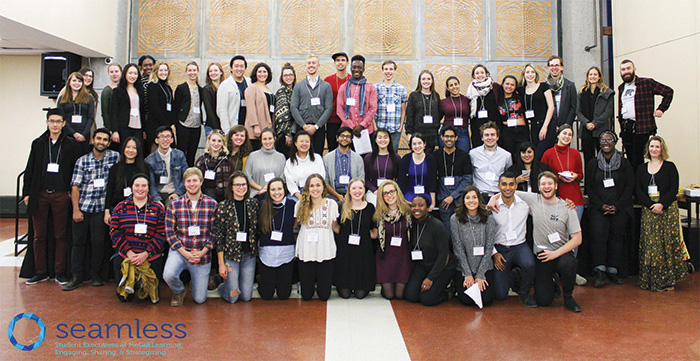The Students’ Society of McGill University (SSMU) and Campus Life and Engagement (CL&E) invited speakers from six McGill offices to table at the fifth annual Student Executives at the McGill Learning, Engaging, Sharing, and Strategizing (SEAMLESS) summit on Oct. 24. The event aims to inform student leaders about services provided for the McGill community.
Tables at the summit included information on consent education and the Draft Policy against Sexual Violence, social equity and diversity education, co-curricular record and career planning, mental health, advocacy on and off campus, and student rights and responsibilities.
According to co-organizer and Student Life Project Development Specialist Aleksandra Djurdjevic, CL&E has changed the format of SEAMLESS this year.
“We have made this one much shorter [in length than in past years],” Djurdjevic said. “It was only two hours and we want to have it monthly. So, the biggest change is frequency. How often we want to have this event? We also want to connect with more stakeholders at McGill, so we are giving people the freedom to choose which resources seem the most important to them and we are going to get feedback and use that feedback to inform future events.”
Consent education
Harm Reduction Liaison Officer Bianca Tétrault spoke about the Draft Policy against Sexual Violence and consent education. In particular, Tetrault discussed a poster campaign that disseminates information around campus about responding to disclosures of sexual violence.
“I launched these poster campaigns recognizing I cannot get everyone to a workshop, but understanding that I can get people the materials to know how to respond,” Tétrault said.
Tetrault also encouraged faculties to get in contact with the Office of the Dean of Students to run workshops within their faculties, emphasizing the new active bystander workshop run in collaboration with Student Services and Residence Life. The workshops teach students how to interrupt situations that could potentially lead to sexual violence.
According to Tétrault, the McGill administration recognizes the Dean’s Office’s work on the issue of sexual assault in addition to assistance from other groups.
“There are other groups working on [this issue], for example [the Sexual Assault Centre of the McGill Students Society (SACOMSS)],” Tétrault said. “So, of course, there are other people who can work with us.”
Mental Health
McGill Student Services Mental Health Education Coordinators Tamara Cassis and Chloe Rourke spoke about the importance of faculty-based mental health initiatives in meeting the needs of individual faculties.
“The faculty-based option is that it is something you can do right away,” Cassis said. “It is a piecemeal approach, not a university-wide initiative, but it does mean we can tailor our programs to each faculty.”
According to Cassis, there is a diversity of mental health resources offered to the McGill community by Student Services.
“We provide a menu of options of things that we can offer, things like workshops, needs assessments, integrating lecture material into your courses, creating physical spaces for mental health,” Cassis said.
This approach has been successful in the anatomy, education, and music faculties, according to Cassis.
“Anatomy had a 35 per cent response rate [to our surveys],” Cassis said. “The response was that 91 per cent of students felt that faculties should take some step to addressing mental health needs. When it came out, it was a lot easier to get faculty members on board.”
According to Cassis, the Faculty of Music—based on a needs assessment survey—introduced easily accessible ice packs for injured students, and began providing relaxation zones to help reduce burnout rates amongst students.
Larger faculties, such as the Faculty of Arts, present different challenges.
“We think about [mental health] more on a departmental level [within the Faculty of Arts],” Cassis said. “It is such a big faculty, so it is harder to handle.”







